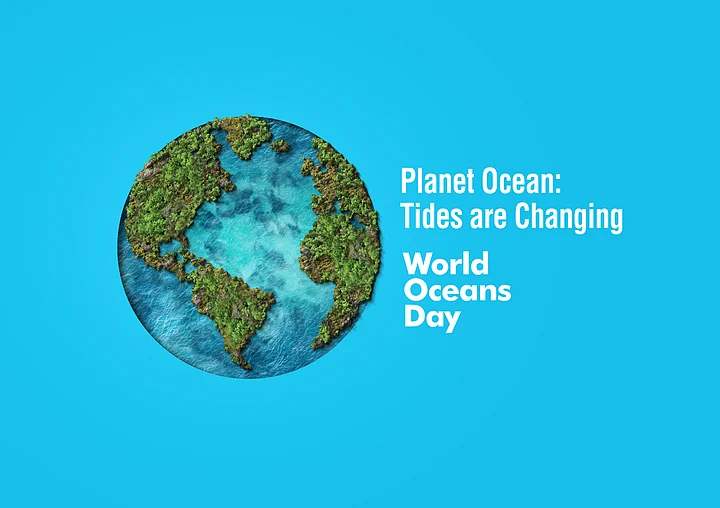World Ocean Day Speech: This year, World Ocean Day (WOD) will be celebrated on Saturday, 8 June. The significance of this day is to raise awareness about the necessity of protecting the oceans and the implementation of global sustainable development goals. It is a part of the global movement '30x30' with the goal of safeguarding at least 30% of the world's land, waters, and oceans by 2030. According to experts, the ocean plays a vital role in sustaining humanity and other organisms on Earth.
The theme of World Ocean Day 2024 is 'Awaken New Depths'. World Ocean Day provides an opportunity to raise public awareness about the threats faced by oceans and their conservative measures. It also serves as a reminder of the importance of the ocean in our planet's economy and society. To spread awareness awareness among students, lets u check out some World Ocean Day speech ideas below.
World Ocean Day Speech for Students
Following are some of the speech ideas for students on the occasion of World Ocean Day 2024.
Speech 1: Significance of World Ocean Day Celebration
World Ocean Day (WOD) is a day dedicated to the vast bodies of water that cover more than 70% of the planet. The day is observed on 8 June annually. The significance of celebrating World Ocean Day is to raise awareness about the importance of oceans in our planet's health and well-being. The oceans are home to a wide range of marine life, from tiny plankton to the majestic blue whale. This biodiversity plays a vital role in maintaining the health of the marine ecosystems. World Ocean Day also highlights the role that oceans play in regulating the earth's climate. They absorb carbon dioxide and heat, acting as a buffer against climate change. Millions of people rely on the oceans for their livelihood through fishing, tourism, and transportation. Let us pledge to show our support, no matter small or big in preserving the health of our oceans for upcoming generations.
Speech 2: Effect of Plastic Pollution on Ocean Health
As we celebrate World Ocean Day, it is important to highlight the pressing issue of oceans and that is plastic pollution. Millions of tons of plastic waste ends up in our oceans every year, creating devastating garbage patches. Marine animals are particularly vulnerable to plastic pollution, as they often mistake it for food. This can lead to injury, illness, and even death. Turtles, birds, and fish are among the most vulnerable marine animals to microplastic pollution. Even humans are can be affected by microplastic pollution because it has entered into the food chain. We can all help to reduce plastic pollution by making simple changes in our everyday lives, such as using reusable bags and bottles. By taking small steps, we can make a big difference in protecting our oceans and the marine animals that call them home.
Speech 3: How Sustainable Fishing Helps in Ocean Health Restoration
Overfishing is one of the main reasons for degrading the quality of oceans because it not only depletes fish populations but also disrupts marine ecosystems. One of the best ways to overcome the problems of overfishing is to promote sustainable fishing practices, which plays a significant role in restoring the health of oceans by replenishing the loss of fishes. Some of the common methods to replenish the fish stocks include, regulated fishing quotas, protected marine areas, and sustainable aquaculture. By following these methods, we can help ensure the long-term health and productivity of our oceans. We can also support sustainable fishing by choosing seafood that is certified by organizations like the Marine Stewardship Council. By advocating for and practicing sustainable fishing, we can make a difference in the fight to restore the health of our oceans.
Speech 4: How Healthy Oceans Help Against Climate Change
As the carbon dioxide (CO2) levels rise in the atmosphere, the oceans absorb a significant amount of it, helping to mitigate climate change. The increased CO2 levels are causing ocean acidification, which is harming marine life. The oceans have a vital role in maintaining the health of the planet's ecosystems and providing a buffer against climate change impacts such as sea level rise and extreme weather events. To protect the oceans and mitigate climate change, it is essential to reduce carbon emissions and support conservation efforts. By taking these actions, we can make a positive impact on the future of our planet.
Speech 5: How Coral Reefs Maintain Ocean Health
On World Ocean Day, let us highlight the contribution of coral reefs preserving ocean health. Coral reefs are the foundation of marine ecosystems, providing a home to a wide range of marine creatures. Coral reefs also play a vital role in protecting coastal areas from storms and erosion. They are natural barriers, helping to maintain the structural integrity of our coastlines. In addition to providing food and shelter for a variety of marine organisms, coral reefs also contribute to local economies through tourism and fishing industries. Protecting coral reefs is essential for maintaining ocean health and biodiversity. By taking steps to reduce carbon emissions and support reef-friendly businesses, we can help ensure the preservation of these underwater treasures for future generations.
(Disclaimer: Parts of this article were generated by AI and published after the content was editorially modified and verified by a human based on their own judgement and expertise. The Quint does not publish AI-generated content without direct human involvement and oversight).
(At The Quint, we question everything. Play an active role in shaping our journalism by becoming a member today.)
